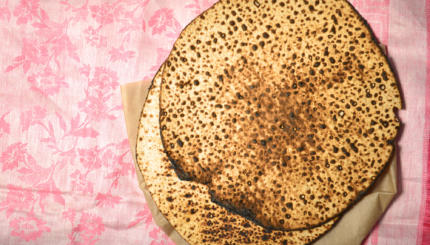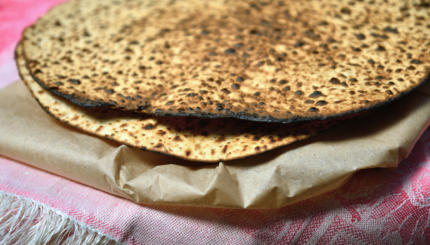Although the winter in the Northeast was milder than the past few, I still struggle with the season of cold and shortened days of the Winter Solstice. I am one who sees myself as diagnosed with Seasonal Affective Disorder (SAD). Indeed, the impact of winter, punctuated with the instability of our world has made many of us collectively welcome spring with a zestful sense of gratitude.
The ground is softening and the flowers are budding. There is renewal in the air. If the barren trees can bear new life, then I always believe that we can rejuvenate also. We, too, are a part of the organic rhythms of nature. Spiritually we have the opportunity to be redeemed; to feel free.
Freedom is indeed the theme of the season; manifested most at our Seder tables as we just sat down to celebrate Passover. With that, I would like to I share three ways I use to try each year to help me leap towards redemption.
Let’s Get That Darn “Egypt” Out of Us:
Egypt (Mitzrayim) literally translates as “narrow place.” The Passover drama unfolds around the idea of God redeeming our ancestors from the bonds of Egyptian slavery. For four hundred years, we toiled in oppression, until finally, God called Moses to lead us from our misery. The intransigent Pharaoh had to be convinced through the miraculous horrors of the ten plagues to finally let the Israelite people go. But the band of slaves, ironically enough, had to be convinced as well. They had become accustomed to the “narrow” conditions. They lived in misery, but they had become used to what was familiar. Paradoxically, we had to be convinced to want freedom from slavery in Egypt.
We all know we are no longer slaves in Egypt. But that does not mean we are necessarily free. I believe that all of us deal, in one way or another, with feeling enslaved from within. Egypt/slavery manifests itself in many forms: jealousy, negative judgment, envy, fear, addiction, apathy, pessimism, guilt; to name a few. During this Passover Season, as we read about how difficult it was for our ancestors to leave uncomfortable, yet familiar oppression, I wonder about what it might mean to think about releasing ourselves from the bonds of self-afflicted slavery. The Passover narrative is ancient, but also one which might call us to strive for freedom now. That age-old story of redemption from Egypt perhaps is a call for us to have the courage to get that Egypt out of us.
Thought Two: Do Not Celebrate the Defeat of Your Enemies: They, Too, Are My Children:
The most dramatic moment of redemption happens at the Sea of Reeds. The Israelites are led through the split sea to freedom, only to turn around and watch as their taskmasters, led by the evil Pharaoh, are annihilated by the enveloping waters. Four hundred years of slavery are over, and the enemy is dead. The Israelites are victorious because of God’s miracle. And now they want to rejoice. They dance and sing wildly in celebration. Suddenly God comes to them and asks, “Why do you dance in such raucous celebration? The Egyptian task masters and their King may have needed to die in order for you to have been redeemed, but do not ever dance in celebration when people die; even when they are evil. They, too, are My children.”
In order for us truly to be free, I think we need to find our way towards being as generous and as open-hearted as possible. Hiding behind a disguise of puffed-up strength may feel right and good, but ultimately, it is self-defeating. Humility and awareness; openness and empathy, lead to freedom of the spirit. I know we are forced to stand up to those who are out to destroy the good in the world. We have to survive and sustain ourselves. But getting so lost in our anger and pain that we want others to suffer, ultimately diminishes us to the level of the evil we detest. We were once strangers in a strange land. I hope that experience impels us to always want to understand the “other” as self. Hating is a burden which only weighs us down.
Thought Three: Have the Courage to Take a Leap of Faith:
Everyone thinks that the sea was split simply because Moses placed his staff in the ocean. However, the Rabbis-of-Old teach that the Sea did not split immediately. Our Sages teach that the waters raged; and the waves were sharp like razor blades. Moses firmly placed his staff in the water, but nothing miraculous happened. That is until a character named Nachshon took a biblically famous leap of faith into the treacherous waters. God was not going to redeem the Israelite People unless the People were willing to work in partnership with the Divine to redeem themselves. Nachshon understood that becoming free took courage, fortitude and will. He was the first one in our history to understand that miracles do not necessarily come from heaven, but from our own empowered ability to be a part of the process of redemption.
Like Nachshon, I believe that sometimes we have to reach down just a bit more deeply to find our courage to be part of the redemptive process. Traditionally, Jews do not believe that God will just swoop down and mitigate our problems. We might want to take our own metaphorical leap of faith and know that once we put ourselves in the mixture called life, we have the possibility of finding our God-given ability to overcome; to succeed; to be free.
I celebrate the arrival of spring. With the sense of renewal in the air; with the realization that nature is blooming with hope and warmth I hope we can all find ways to rejuvenate and renew. We all deserve to have our dreams spring eternal! Here’s to freedom!



